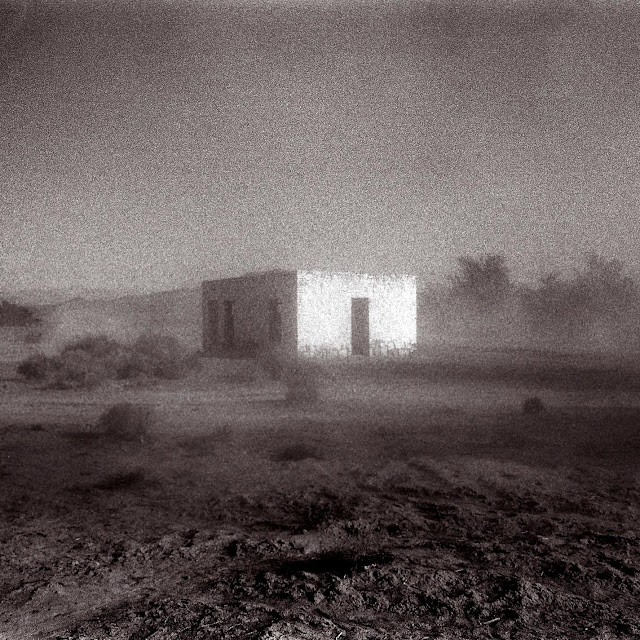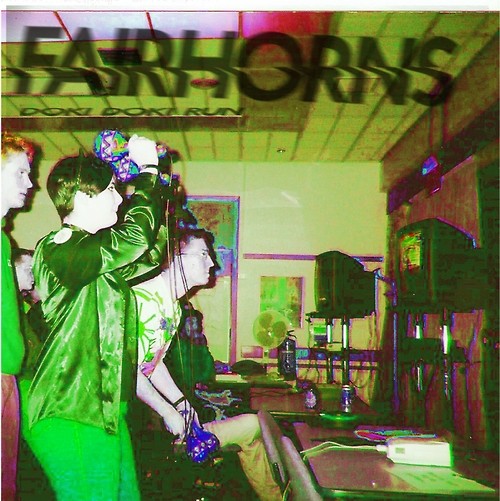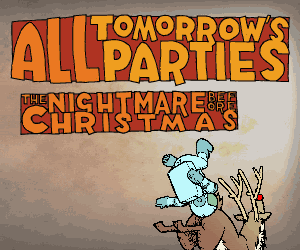
Dots: Given the almost excruciating gap between records one and two, was there an unprecedented feeling of relief once mk.II was out in the open?
Walter Schreifels: For sure. We'd been recording it for a while so once it finally came out that was a huge weight off our shoulders. The whole thing felt a bit like there was a sword hanging over us I guess. So I'm basically happy for it just to be out, and for us to be able to play some shows in support of it. Initially that was exciting as we were just getting back together, but then after that you need to have something so it was cool to have a reason to exist. Makes a change from... shit... four years touring the world, playing acoustic shows on my own! But the experience definitely helped me get to grips with returning to Rival Schools, to give myself to it and to be happy.
Dashes: Were there ever conflicting interests amongst the Rival Schools ranks as to whether you'd ever be comfortable ever revisiting United By Fate, or whether you'd be able to work together again?
Walter: Of course, particularly as we were all starting to get into this, into that, and our schedules drifted further and further apart from one another. We were happy talking about doing it, but when it came to coordinating the time, there was just never any urgency to it. Then two or three years ago, really starting from Cache [Tolman, bassist] and then from Sam [Siegler, drummer] we managed to conjure an urgency, and started saying to each other: "If we don't follow up this album [United By Fate] we never will" so we got on it and booked some shows to start to get the vibe. That's exactly how I saw it, thinking that we'd probably never have done it unless we got on with it at that precise moment so I had to think as to whether that was something that I genuinely wanted to do, or whether it was something we were all just saying to each other.
Dots: Did that entail a fair bit of pressure then, writing and recording the record, given the unforeseeable success of the debut?
Walter: But the success of United By Fate had all but entirely dissipated for me. I just feel like whatever we do, as long as it's our best effort, then that's going to be good for me. Everyone's always going to have an opinion, but as long as we feel that everything we put out is as good as we can give, that's all that really matters in all honesty. But thinking in that way takes the pressure off a little bit. When we made the debut it wasn't as if we sat down and thought: "Ok, let's make a legendary album!", and then spent the rest of the process congratulating each other. You don't try to do that, you just do your best and if it comes out great and feels right and people connect to it then you're onto something special.
Dashes: Has there ever been a temptation to play United By Fate in its entirety and not necessarily feel the need to come up with new material?
Walter: Essentially when we first came back that's really what we did. We were playing new songs effectively because we had to, because we had to try to develop things in some way but after people have seen you do that once, maybe twice, it sort of wears off so I think we've had ample time to redevelop ourselves, to get back on our feet and I think that now that the album's out and people, in general, really like it, that's a good place for us to be at this point in time, with the machine up and running as it were. We're well positioned to write material that can now transcend either of the records we've produced up to this point in time. United By Fate was more a "project" than anything else, and this album too had something of a mission statement to follow up that thing so we're not really like a regular band, even though we're friends and all the usual shit. I'd like to make an album that's really reflective of those experiences and take it to another level. That's what I'm hoping for. But that may not be for another ten years, I can't make any promises.
Dots: Regarding the follow-up, Pedals, how much did you try and look back on, and perhaps attempt to emulate United By Fate, and how perfect a record do you feel the debut is?
Walter: I categorically don't think it's a perfect record, but I think it's perfect in the fact that it made a connection with enough people, that it spoke to them without me even really knowing who those people were and are. It's perfect in that sense, yes. I think there's variety on it, some decent lyrics but I don't really feel as though anything I've ever done in my life has ever been perfect. But maybe it is perfect, I don't know... It's not for me to determine whether it is or isn't. When I listen to my own records, I always consider how they could be improved, which is precisely why I don't listen to them! But with Pedals, we had to try and make it consistent with this record that we'd made so long ago, and have it follow its predecessor in some way that makes some sort of sense, that's perhaps in some way more futuristic, perhaps reaching forward into something else.
Dashes: Did you feel the need to "update" the sound of United By Fate, or did you all but disregard changing times and trends?
Walter: The most important aspect is that we weren't trying to follow anything but our own trajectory because that was really not for us, to follow others. After United By Fate we recorded maybe ten or twelve songs and some seeped onto the internet so we had a starting point, and doing those reunion shows gave us a feeling of who our fans were, which is obviously another important thing, to see who cares about us, and to get to know them. So that helped to get our identities together having been apart for so long. And that made the whole process of sorting out labels and all that kind of shit bearable, as well as helping us to become a forever tighter unit. For instance this particular tour is probably on the longer side, and that's helping us too, to get back into the swing of things...
Dots: How do you view touring these days, ten years or so down the line?
Walter: I've a daughter now so I don't really like spending time away from her. Touring's still fun, I enjoy it, but we're really selective with the shows we play. I don't think we'd do an opening tour for just anybody... We wanted to tour with Trail Of Dead predominantly because we're fans. We've known those guys for years so when Sam ran into Conrad [Keely] in a park in New York, and having come up at the same time as them, it became something of an inevitability that we'd join forces and tour together. Every night when I watch them I think these guys have made four or five albums in the time we've made none, they've done this touring thing every year, quite extensively, so it's cool to get to watch them so much as a fan, but also as a kind of study as in certain respects we've got a fair bit of catching up to do. I'm hoping we can leapfrog that. But I don't want to tour unless it feels as though I'm really getting something out of it, and we're not just touring for the sake of touring. I don't feel like we need to break ourselves by playing every little town in every country any more.
Dashes: And Asobi Seksu are on the bill too, again quite a different proposition. Do you guys get to indulge in much newer music?
Walter: I do, but I've always been interested in past stuff, that's in a rather more static condition in that I can just get it and get straight into it. But I listen to new music, yeah. There's so much out there that it doesn't often penetrate but when it does it's great. I like a band called Murder from Denmark. They gave me a couple of their CDs after I played with them over there, but there's so many bands that get thrust at you with the tagline: "Oh you've got to listen to Mass Quantities of Opium, they're amazing, oh my God! Listen to this song!" And then it just sounds like Interpol and you'd feel all smug if you were out and you heard it in a store, just so you could say you'd heard it and could identify it, and then they're gone, before you get Mass Quantities of... something else... Mass Quantities of Opium Say Yeah! And that's why the process of discovering something has become quite so tricky, simply because there's so much to take on. I'm careful giving my heart away, let's say...
Dots: Do you feel as though the dynamic of the band has substantially changed over the past decade?
Walter: Back then I guess we had things, and people, driving us on. We had a record label that was pushing us. We were in the '90's, there was more demand, they had to keep us on the road, there was more money involved, everything was coming at us so quickly and constantly whereas now we've built who and what we are pretty much on our own. We went and found our own record label so the industry has definitely changed and we have a lot more commonality in what we want so I think when we decide to do something, we've all consented to it, there aren't the same pressures as there were before. It's better knowing that nobody's twisted your arm or kissed your ass into doing something you don't really have any desire to do. We don't fight about shit like that whereas at one point we might have got more aggressive with each other.
Dashes: Aesthetically you guys don't really look like your stereotypical hardcore band. Was it the New York connection that drove you to the heavier side of melodic?
Walter: I guess I got into hardcore when I was a teenager, at fifteen or sixteen because the cool thing to do at that time was to go to hardcore shows. It wasn't the only kind of music I liked, but I got into bands that way. That's how I learnt to be in a band, through hardcore so I learnt how to make mosh parts and that sort of thing. The Rolling Stones started out in R'n'B but they meld that into other genres and I think that's pretty much what we do with hardcore. I don't think I dress that differently to how I did back then at sixteen to be honest, sadly. Maybe I haven't really progressed all that much in that time frame...
Dots: What with plenty of bands now not just chopping and changing styles but stylists too, maybe that's not such a bad thing...
Walter: I mean I want to change style, particularly perhaps musically. When we first came out we were linked in with the whole emo thing, but that really had nothing to do with us. It was cool that we benefitted from it in that we got hyped more, but I never thought: "Oh we're doing something emo now", either musically or stylistically.
Dashes: Presumably you'll still be garbed in the same attire ten years on from now. But are we to be kept waiting another ten years for the next album?
Walter: It'll either come very soon, or it will be another ten years. If we can't get it together in the next year and a half, then we'll reconvene in 2019 and get cracking. They're the only options we've really got - come up with something quick and really awesome, keeping the momentum going, or we can just wait ten years. I'm not quite convinced which is the better solution, but we're looking at those kinds of options.
That night they put paid to the Electric Ballroom, whilst Pedals is out now on Photo Finish.























